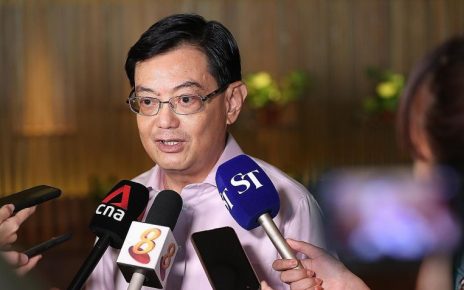The Disciplinary Tribunal’s findings on the conduct of lawyer Lee Suet Fern makes plain its conclusions on several key questions concerning the drafting and signing of the last will of her father-in-law, Mr Lee Kuan Yew – and over his wishes regarding his 38 Oxley Road home.
The tribunal, in its report released last Tuesday, established that the late , who rushed him through changes to his last will, on a number of items.
Many of these questions had been raised in mid-2017, when the feud between the children of founding Prime Minister Lee Kuan Yew spilt over into the public sphere, causing much consternation throughout the country.
On June 14, 2017, Dr Lee Wei Ling and her brother Lee Hsien Yang – whose wife is Mrs Lee Suet Fern – issued a statement hitting out at their brother, Prime Minister Lee Hsien Loong, saying he misused his position.
At the centre of the dispute was their father’s 38 Oxley Road house. The two siblings alleged that PM Lee wanted the house preserved against their father’s wishes, to boost his political standing and that of his own family. But PM Lee refuted their accusations in a statement made in Parliament. He also raised misgivings over the preparation of their late father’s will.
One issue was the so-called demolition clause on Mr Lee’s wishes that the house be demolished, which was in his first four wills, taken out of the fifth and sixth will, and reinstated in his last will.
PM Lee, through his lawyers, issued a statement raising grave concerns about the way his father’s last will was made. It is a summary of statutory declarations PM Lee made to the ministerial committee on 38 Oxley Road.
The statement included several questions, among them:
- What was Mrs Lee’s role in the preparation and signing of the last will?
- Were the provisions of the last will explained to Mr Lee Kuan Yew, and if so, who explained them to him?
- Did Mr Lee Kuan Yew give specific instructions to re-insert the demolition clause in the last will, and if so, to whom?
- Was there a conflict of interest on the part of Mrs Lee, her fellow lawyers and her firm?
In 2018, the Attorney-General’s Chambers (AGC) wrote to Mrs Lee several times asking her to explain her role, if any, in preparing the last will. But she did not answer the questions despite asking for more time, it said.
Last year, the AGC referred the case to the Law Society, and Deputy Attorney-General Lionel Yee further asked that it be referred to a disciplinary tribunal.
The tribunal found, among others things, that:
- Mr Lee Hsien Yang and Mrs Lee rushed through the last will with Mr Lee Kuan Yew overnight on Dec 16 and 17, 2013, while his lawyer Kwa Kim Li was away. The couple cut off Ms Kwa from communications with Mr Lee Kuan Yew on it.
- Mrs Lee “gave the briefest of advice to Mr Lee, and did not alert Mr Lee to all the differences between what Mr Lee had earlier wanted and what the last will actually provided for”, as she was required to do as a lawyer. Nor had she advised him to seek independent legal advice, since her husband stood to gain from the changes being made, as was also required of her as a lawyer.
- Mr Lee Kuan Yew was not advised that the last will had a demolition clause inserted, even though he had deleted this in several earlier versions of his wills and had not indicated to Ms Kwa that he wanted this reinstated when he discussed changes to his will just four days earlier. Mrs Lee knew this clause had been reinstated as she mentioned it to her colleague, Mr Bernard Lui, who disclosed this to the tribunal.
The tribunal found that her conduct in taking instructions from her husband on arrangements relating to the last will were “an aggravating factor which increases the egregiousness of the conduct”. The courts have stressed that solicitors should be wary of taking instructions solely from a beneficiary to a will, it added.
The tribunal also found that Mr Lee Hsien Yang and Mrs Lee tried to suppress their central role in what happened by lying about what happened, and trying to suppress evidence on what happened from being revealed.
The tribunal concluded: “The respondent’s motives, in sending a draft to Mr Lee which completely superseded the sixth will, and in rushing the execution of the last will, are in serious question.”
The report did not go so far as to say what these motives might be, but pointed in several parts to how Mrs Lee’s husband stood to gain a larger share of the estate, as well as from the reinstatement of the demolition clause, on which the dispute over the future of 38 Oxley Road centred.
WHAT NEXT?
The issue of professional misconduct by Mrs Lee will have to be dealt with by the courts. Going by previous cases, where a lawyer is found to have acted dishonestly, the Court of Three Judges could order that he or she be struck off the rolls.
The tribunal said the misconduct Mrs Lee is guilty of is a serious departure from the most basic standards expected of a lawyer – complete honesty and fidelity to his or her client. “To leave such egregious and dishonest conduct unsanctioned would bring disrepute upon the profession,” it added.
Its findings also resurface the issue of whether Mr Lee Kuan Yew’s wishes on the 38 Oxley Road home were misrepresented in his last will, and could reignite that debate, as well as the bitter and protracted family feud, that shocked – and greatly saddened – Singaporeans.

